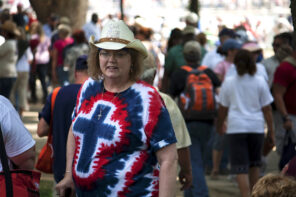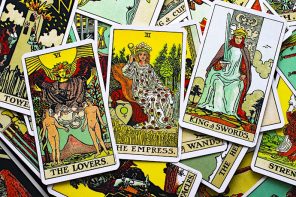What inspired you to write Dispirited?
The opening line of the book has raised some eyebrows, and some friends felt it ought to go, but it really seemed to capture the emotional motivation for this project:
When someone tells me that they are “Not religious, but very spiritual,” I want to punch them in the face.
Hard…
Of course, I go on to note that I resist such temptations—for reasons of ethics and cowardice. However, this annoyance was something I wanted to investigate. Why did it wind me up so much?
This was combined with other factors. Partly it was frustration at writing scholarly, detailed academic work—which hardly anybody read. I wanted to do something with a more accessible tone, but that was still about ideas that interested me.
Thinking about my aggressive grumpiness led me to read lots of new-age and mind-body-spirit catalogues. This didn’t help. In many ways I became more and more annoyed by some of the materials and adverts that I encountered. However, I was convinced that these cultural phenomena were worthy of critical investigation.
My annoyance really peaked when I read through these catalogues, and saw that the endless sessions advertised in them all seemed to sit happily side-by-side. Yet if you literally believed the metaphysical and empirical claims they made and implied, they were more often than not logically incompatible. There seemed to be an illogical almost anti-rational and extreme open-mindedness. No claim, no matter how preposterous or unfeasible, seemed to be unacceptable—and to question the claims was seen as either spiritually naïve or as being locked into some kind of pro-conflict, old-religion mindset of harsh exclusivism. For me, when looking at particular new-age material this ‘everyone is right, all paths are valid’ approach was not only untenable and intellectually insulting, it all too often edged into smugness.
So I complained. I moaned to my friends. It’s usually only in conversation that you can see where an idea might lead, so in many ways this book was born in the beer gardens of Cheltenham pubs. And from my friends telling me to shut up and write it down if it bothered me that much.
What’s the most important take-home message for readers?
That the idea of being “spiritual, but not religious” is, at the very least, problematic. As I suggest in the book, mind-body-spirit spirituality is in danger of making us stupid, selfish, and unhappy.
Stupid—because its open-ended, inclusive and non-judgemental attitude to truth-claims actually becomes an obstacle to the combative, argumentative process whereby we discern sense from nonsense. To treat all claims as equivalent, as valid perspectives on an unsayable ultimate reality, is not to really take any of them seriously. It promotes a shallow, surface approach, whereby the work of discrimination, of testing claims against each other, and our experience in the light of method, is cast aside in favour of a lazy, bargain-basement-postmodernist relativism.
Selfish—because the ‘inner-turn’ drives us away from concerns with the material; so much so that being preoccupied with worldly matters is somehow portrayed as tawdry or shallow. It’s no accident that we see the wealthy and celebrities drawn to this very capitalist form of religion: most of the world realizes that material concerns do matter. I don’t believe that we find ourselves and meaning via an inner journey. I’m not even sure I know what it means. While of course there is course for introspection and self-examination, this, I argue, has to be in a context of concrete social realities.
Finally, I argue that the dissembling regarding death in most contemporary spirituality—the refusal to face it as the total absolute annihilation of the person and all about them—leaves it ill-equipped to help us truly engage with the existential reality of our own mortality and finitude. In much contemporary spirituality there is an insistence of survival (and a matching vagueness about its form) whenever death is discussed. I argue that any denial of death (and I look at the longevity movements briefly too) is an obstacle to a full, rich life, with emotional integrity. Death is the thing to be faced if we are to really live. Spirituality seems to me to be a consolation that refuses this challenge, rather seeking to hide in the only-half-believed reassurances of ‘spirit’, ‘energy’, previous lives, and ‘soul’.
Is there anything you had to leave out?
Yes. I wanted it to be a short, sharp book: and this meant being ruthless with myself. Mostly. I had to remove extended discussions of Buddhism—which I digressed into because of my academic background in that area. I also left out some of the grumpiness, but that may be hard for readers to believe.
What’s the biggest misconception about your topic?
I would say the misconception that astrology, reiki, crystal-healing, cosmic ordering, and the like are just a harmless bit of fun. I argue that they have a substantial potential for negative consequences.
The biggest misconception I’ve faced in talks I have given on this topic is that I am defending conventional, organized religion—which I am not. What I do argue is that those aspects of traditional religions that have been interested in social justice, equality, and material needs (and there have been plenty, along with the negative impacts of much of religious history) have also recognised the dangers of too-thin, obfuscatory mysticism—and developed intellectual responses to it that contemporary atheists shouldn’t dismiss.
Did you have a specific audience in mind when writing?
When writing the book, I wanted it to be accessible to as wide an audience as possible. But I did also have, at the back of my mind, those who had always been disturbed or annoyed by much in the contemporary spiritual milieu, and wanted to explore and give voice to those concerns. I also wanted to engage some of those interested in the (often crass and pointless) shouting matches between theists and atheists that fill so many books, internet forums, and newspaper columns.
I think that both groups have rather overlooked the ‘Spiritual But Not Religious’ and the rather distinctive issues that surround these approaches. I also wanted to demonstrate, albeit briefly, that even though someone may be an atheist, they may find more to inspire them in the depth of some conventional religions (while utterly rejecting their metaphysical claims), and their engagements with existential questions than in much of the mind-body-spirit realm.
Are you hoping simply to inform readers? To entertain? To make them angry?
Hopefully all three, in varying amounts! I’d like to think the book wasn’t dull, and I know from presenting its contents in seminars that it has made some listeners more than a little vexed—but most of all, I would like to people would find it interesting. Some audience members at talks have, and questioned whether an academic writer ought to be offering, especially as I do so in an assertive manner, such clearly negative value judgments.
I appreciate that point, and would not speak to students in the same tone as I use in Dispirited. That said, I feel that all academics offer their opinions in their subject, and that it might be better if people were open, honest, and took responsibility for their opinions. Also, theologians (for example) are often very open about their religious stance, and its ethical implications—so there shouldn’t be a double-standard for critical, reflective, atheist voices.
What alternate title would you give the book?
I was going to call it “Toxic Spirituality,” then discovered a book of essays with the same title, and was a bit stuck. Luckily one of the editors at Zero Books suggested “Dispirited”—and it seemed to fit the content perfectly (though I just discovered a novel with this title has been recently released too!).
How do you feel about the cover?
I love the cover: it is bold, and the publishers have a very distinctive look to all their books and a loyal readership that associates the look and the series. I was really pleased to be able to see my work in the same series.
Is there a book out there you wish you had written?
Fear and Loathing in Las Vegas (Hunter S. Thompson). After my desire to have a strong opening sentence, I’d love to have this one: “We were somewhere around Barstow on the edge of the desert when the drugs began to take hold.” Also, having written this, I suspect, would have meant that I’d have got to have had that much fun—and get away with it.
What’s your next book?
That is just what I’m trying to work out at the moment. I may do another academic project—maybe an edited collection on mindfulness, which seems everywhere at the moment. I think there is scope to examine the roots of this practice, and its popularity.
Beyond that, I’d like to write a sequel to Dispirited to look at a range of possible philosophical futures for atheistic existentialism, and how much scope there might be for an interplay with some ideas from the Buddhist Pali texts. Maybe.




